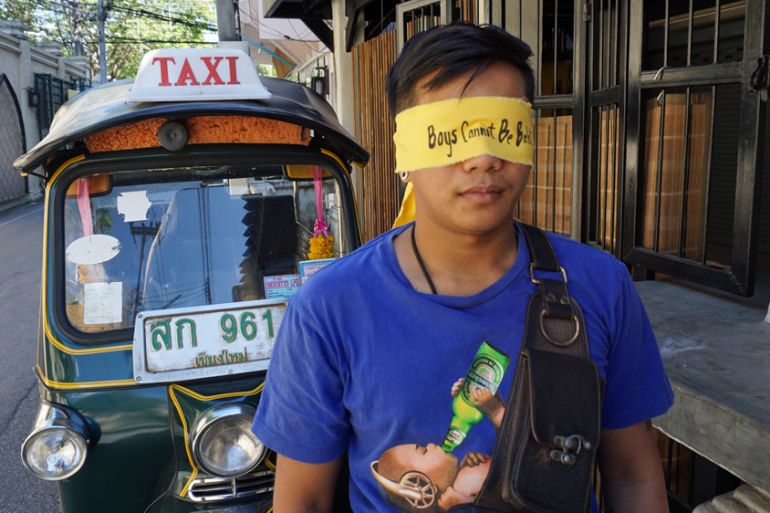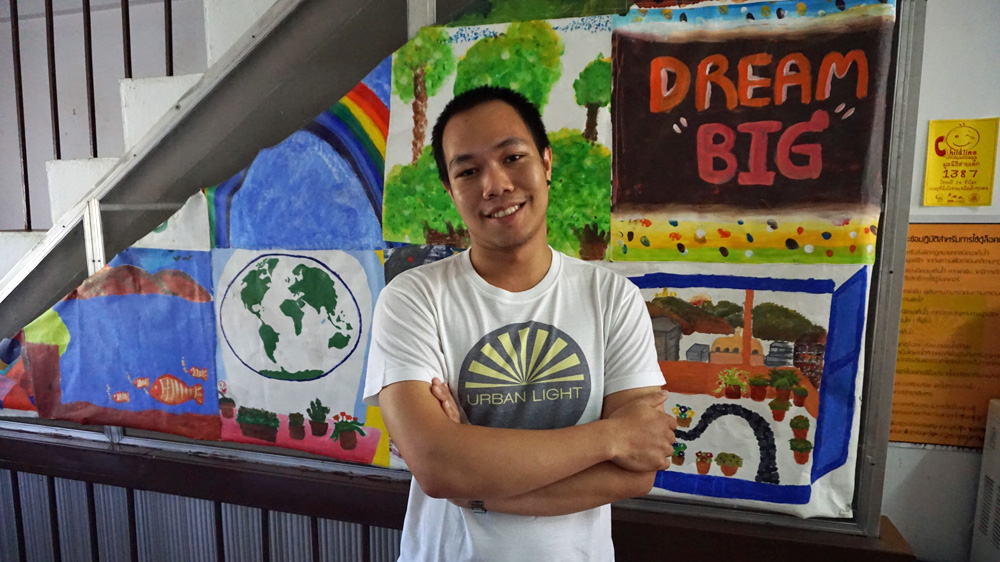Rescuing boys from Thailand’s northern sex trade
NGO Urban Light in Chiang Mai has reached 5,000 teenagers caught up in prostitution rackets in Thailand’s second city.

Chiang Mai, Thailand – Krit hangs out near McDonald’s most days, polishing the hood of his green tuk-tuk and waiting for customers. He can make as much as 3,000 Thai baht ($92) in a day driving tourists around this northern city.
Several years ago when Krit was just 16, this picture was very different. His customers were still Western tourists, but they went to him for sex, not tuk-tuk rides. Krit was a victim of Thailand’s sex-trafficking trade. For five years he worked in seedy bars and dingy massage joints in Chiang Mai’s red light district. He endured cruelty and exploitation, forced to go home with the men who venture to these dark places to buy sex with children.
Keep reading
list of 4 itemsTunisia: The migration trap
Children of the Darien Gap
Girls in Africa have every right to be children
It was a horrific life that forced Krit to the brink; the teen was later hospitalised with HIV, and almost died. But he made a miraculous recovery and went on to set up his own tuk-tuk business.
“I feel independent because I can control my own life,” says Krit, whose name has been changed to protect his privacy. “I don’t need money from customers in the bars. I have a new desire to change my life, to work hard and take care of myself. I feel lucky to be alive.”
Now Krit is teaching other teen boys – also sex-trafficking victims – to drive the noisy three-wheel taxis. He takes them to abandoned parking lots to practice changing gears and reversing. They practice English and learn how to read maps.
It’s part of a project run by Urban Light, the only NGO in Thailand that supports male victims of sex trafficking. The country is a notorious destination for sex tourists, and has one of the highest rates of child prostitution in the world. But the plight of boys is much less understood.
Reliable numbers are difficult to come by with most research overlooking boys. The UN estimates that almost 30 percent of all trafficking victims are male, but this includes forced labour, not just sex trafficking. In Thailand there’s a higher prevalence of young boys performing survival sex on the streets, according to the Global Slavery Index.
Urban Light founder Alezandra Russell insists that sex trafficking “is now a multi-billion dollar industry that’s affecting both genders”. Her organisation provides health check-ups, counselling, education and housing programmes – and has reached 5,000 boys in seven years.
![Now Krit teaches teen boys - also sex-trafficking victims - to drive the noisy three-wheel taxis [Clare Wiley/Al Jazeera]](/wp-content/uploads/2017/12/545e201e2c084fb38cc46485fcf73dbb_18.jpeg)
Refuge
On a quiet afternoon here at the Urban Light centre, teen boys lounge around after a big lunch of homemade Pad Thai. Some nap or watch movies in the breakroom. Others play ping pong, lift weights and smoke cigarettes on the little rooftop. The boys are wary but friendly, smiling shyly. This is a safe space for them, a refuge.
Russell launched Urban Light after an eye-opening visit to Chiang Mai’s red light district in 2009. The young American was there to research trafficking in an effort to support girls, but was shocked to see Western men sitting in bars with 14-year-old boys on their laps. When she tried to help, Russell was told, “Save your time for the girls, those boys are just going to get HIV and die.”
“I got really pissed off,” she says. “I went back to the bars later that night.” The boys were curious about the only woman in the bar, and Russell gradually gained their trust by buying them bottles of coke, playing games and chatting about football in broken Thai. She felt distraught and helpless when one by one, customers came to buy the boys and take them away.
Russell visited the bars every night of her two-week trip. When she returned to her life in Washington DC, she couldn’t stop thinking about what she’d witnessed. “I sold my wedding ring and used that money to get back to Thailand and rent a little space in the red light district.”
Urban Light staff hand out condoms and fliers in bars and brothels in touristy areas of the city that seem innocuous enough, but are notorious spots for Western men (and increasingly Chinese and Thai men, Russell says) to find children for sale.
Poor and vulnerable

There’s a widespread misconception that victims of sex trafficking are kidnapped and locked up, but the reality is more complex. “They’re not chained to the bars, but they have so much psychological pressure that keeps them in that lifestyle,” says Russell.
Many of the boys are from northern Thailand’s hill tribes: impoverished, uneducated and without official papers. Traffickers lure these vulnerable teens into bars with the promise of a salary, then trap them in a vicious cycle of drug addiction, debt and violence.
The ultimate goal, of course, is to remove these boys from the situations they’re in, but Russell knows this has to be a decision the boys make themselves. “We’re really trying to show them that they have so much more potential than working in a bar or massage parlour, and that we can help them get there.”
Chaow was just 14 when he came to Urban Light. An orphan from a hill tribe community, he left school at 12 and took work in a Chiang Mai bar. He naively believed he’d only have to sell alcohol, and needed the money to send home.
“As the youngest, he inevitably was the one that all the men wanted,” says Russell. “He quickly realised what he was expected to do. For the next three years, he would live that life. As desperately as I wanted to get him out, I knew that he had to make that choice. One day he came to me in utter tears and said ‘that’s it, I’m done’. You could see the depression all over his face.” Urban Light helped Chaow get an apartment, finish school, and find work as a door-to-door salesman.
Equipping the boys with job skills is a crucial part of the organisation’s work. In addition to the tuk-tuk programme, some boys are training to become barbers.
“These are alternative ways for them to become entrepreneurs, to make their own money, to be their own bosses and see how they can thrive,” Russell says.
![Alezandra Russell gave up her life in Washington DC to launch Urban Light and help boys caught in the sex trade [Clare Wiley/Al Jazeera]](/wp-content/uploads/2017/12/ed6e84975d56466fadabd19d8be6323f_18.jpeg)